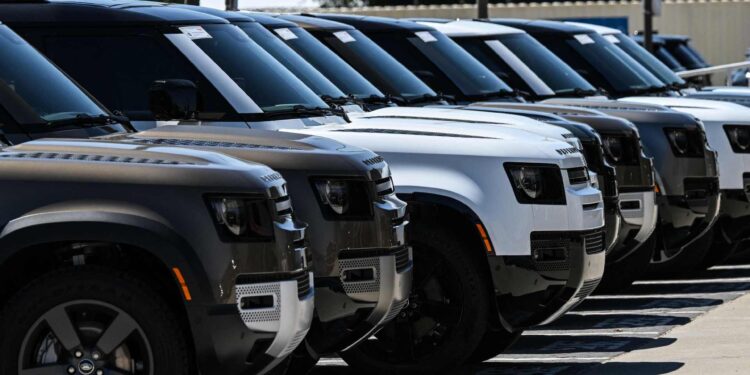Washington In front of a car showroom in the Armington suburb, north of Virginia (in the eastern United States), sales representatives are lining up waiting for potential customers, exchanged conversation and watching traffic. The atmosphere appears on the surface, but their face expressions indicate an escalating anxiety, as if an imminent economic turmoil waving on the horizon.
Jose, a Latin origin sales representative, says in an interview with Al -Jazeera Net, that he is following the news daily, but he has not yet been a decisive opinion about the distant impact of the new customs duties announced by US President Donald Trump. “Most likely, the prices of cars will rise, and this will negatively affect our income, as we live on sales commissions. The worst scenario is for Americans to stop buying or replacing cars,” he added.
These fees, which amount to 25%, fall on car imports and spare parts, within a fever commercial policy pursued by the Trump administration with the aim of encouraging local manufacturing and reducing the trade deficit, especially with major partners such as China and the European Union.
While the administration considers that this policy will push companies to redirect their investments within the country, economic reports warn of their reverse repercussions, including high car prices, decline in demand and disturbance of supply chains.
Markets are awaiting and consumers hesitate
At the “Toyota” exhibition in Springfield, in East State, Director General Brian Latimer explained to Al -Jazeera Net that sales were not affected now directly, noting that the market is going through a “anticipation phase.”
He said, “The actual effect may only appear after the definitions are entered into full implementation, or after the issuance of new instructions from manufacturers,” he said.
Latimer pointed out that the customers are asking a lot about future prices and the availability of models, which reflects a state of general caution, but the market, according to him, has not yet witnessed a wave of panic or a clear decrease in sales movement.
In light of the division of the effectiveness of this policy, Ford (the American auto giant) announced its intention to raise the prices of some vehicles if the new fees are not canceled. As for “Volkswagen” (the German giant), it confirmed that it will maintain the current prices until the end of May, but it did not exclude future increases to compensate for the high costs. These attitudes reflect the increasing challenges facing major companies in adapting to new variables, especially with regard to spare parts supply and manufacturing prices.
Conversations in consumer behavior
On the one hand, consumers are clearly evident. Nicole Molly, a primary school teacher in Washington, was planning to change her car this summer, but the news about customs duties led her to rethink her decision. “I read that prices may continue to rise, and I cannot bear a larger loan, so I will try to fix my car and keep it at least an additional year,” she says.
Nicole’s position is an example of a rapid change in consumption behavior, as large groups of Americans, especially those with intermediate and limited income, are postponed and re -evaluated their priorities.
A recent report issued by the “Redvin” real estate platform confirmed this trend, noting that more than 30% of Americans are postponing their major purchasing decisions due to the ambiguity of customs policies, while more than half of the participants in the survey expressed their anxiety or caution about buying a car or house in light of the current economic conditions.
Union support for academic warnings
On the other hand, the decision to impose fees is supported by some unions, most notably the UAW Automotive Union. “Customs duties are an effective tool to push companies to do what is right, and the aim is to restore jobs to the United States and invest in US employment.”
Despite this union support, many economists warn of the consequences of expanding protective policies without plans to protect the affected people. Among these Professor Kara Reynold, head of the US University’s Economics Department in Washington, who said in her interview with Al -Jazeera Net that the imposition of customs duties of this size will likely lead to high prices, as a result of the contraction of competition in the short and long term.
“We may have already witnessed production operations to North America to avoid fees, but prices will not return to their previous time, because the cost of importing pieces from abroad has always been less than local production,” she added.
Reynold expressed its concern that these policies will harm the United States’ International Trade Relations, saying, “I am afraid that the United States has always caused harm to its commercial partnerships, as the justifications for imposing fees appear contradictory and unclear, and this has exacerbated the state of ambiguity on the future of US trade.”
Jobs are at stake
Previous economic studies indicate that these policies may cause opposite results, especially at the labor market level. A study issued in 2018 by the Peterson Institute for International Economy showed that imposing 25% fees on car imports and spare parts may lead to a loss of about 195 thousand jobs in just one year, as a result of high prices and the decline in demand.
While the US administration is betting on these fees as a way to reduce dependence on abroad and enhance local production, the future of the car market in the United States is still mysterious. In light of the continuation of the controversy between supporters and opponents, consumers and workers alike follow the developments of these policies, which may re -draw the map of global trade and redefine the concept of “made in America”.



